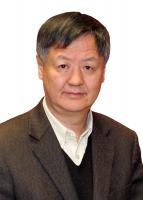Prof Jun Wang
The Chinese University of Hong Kong
Shatin, New Territories, Hong Kong
Neurodynamics-based Parallel Data Processing
in the Era of Big Data
Abstract: In the present information era, huge amount of data to be processed daily. In contrast of conventional sequential data processing techniques, parallel data processing approaches can expedite the processes and more efficiently deal with big data. In the last few decades, neural computation emerged as a popular area for parallel and distributed data processing. The data processing applications of neural computation included, but not limited to, data sorting, data selection, data mining, data fusion, and data reconciliation. In this talk, neurodynamic approaches to parallel data processing will be introduced, reviewed, and compared. In particular, my talk will compare several mathematical problem formulations of well-known multiple winners-take-all problem and present several recurrent neural networks with reducing model complexity. Finally, the best one with the simplest model complexity and maximum computational efficiency will be highlighted. Analytical and Monte Carlo simulation results will be shown to demonstrate the computing characteristics and performance of the continuous-time and discrete-time models. The applications to parallel sorting, rank-order filtering, and data retrieval will be also discussed.
Biographical note: Jun Wang is a Professor at the Chinese University of Hong Kong. Prior to this position, he held various academic positions at Dalian University of Technology, Case Western Reserve University, and University of North Dakota. He also held various short-term visiting positions at USAF Armstrong Laboratory (1995), RIKEN Brain Science Institute (2001), Universite Catholique de Louvain (2001), Chinese Academy of Sciences (2002), Huazhong University of Science and Technology (2006–2007), and Shanghai Jiao Tong University (2008-2011) as a Changjiang Chair Professor. Since 2011, he is a National Thousand-Talent Chair Professor at Dalian University of Technology on a part-time basis. He received a B.S. degree in electrical engineering and an M.S. degree in systems engineering from Dalian University of Technology, Dalian, China. He received his Ph.D. degree in systems engineering from Case Western Reserve University, Cleveland, Ohio, USA. His current research interests include neural networks and their applications. He published over 180 journal papers, 15 book chapters, 11 edited books, and numerous conference papers in these areas. He is the Editor-in-Chief of the IEEE Transactions on Cybernetics since 2014 and a member of the editorial board of Neural Networks since 2012. He also served as an Associate Editor of the IEEE Transactions on Neural Networks (1999-2009), IEEE Transactions on Cybernetics and its predecessor (2003-2013), and IEEE Transactions on Systems, Man, and Cybernetics – Part C (2002–2005), as a member of the editorial advisory board of International Journal of Neural Systems (2006-2013), as a guest editor of special issues of European Journal of Operational Research (1996), International Journal of Neural Systems (2007), Neurocomputing (2008, 2014), and International Journal of Fuzzy Systems (2010, 2011). He was an organizer of several international conferences such as the General Chair of the 13th International Conference on Neural Information Processing (2006) and the 2008 IEEE World Congress on Computational Intelligence, and a Program Chair of the IEEE International Conference on Systems, Man, and Cybernetics (2012). He has been an IEEE Computational Intelligence Society Distinguished Lecturer (2010-2012, 2014-2016). In addition, he served as President of Asia Pacific Neural Network Assembly (APNNA) in 2006 and many organizations such as IEEE Fellow Committee (2011-2012); IEEE Computational Intelligence Society Awards Committee (2008, 2012, 2014), IEEE Systems, Man, and Cybernetics Society Board of Directors (2013-2015), He is an IEEE Fellow, IAPR Fellow, and a recipient of an IEEE Transactions on Neural Networks Outstanding Paper Award and APNNA Outstanding Achievement Award in 2011, Natural Science Awards from Shanghai Municipal Government (2009) and Ministry of Education of China (2011), and Neural Networks Pioneer Award from IEEE Computational Intelligence Society (2014), among others.



